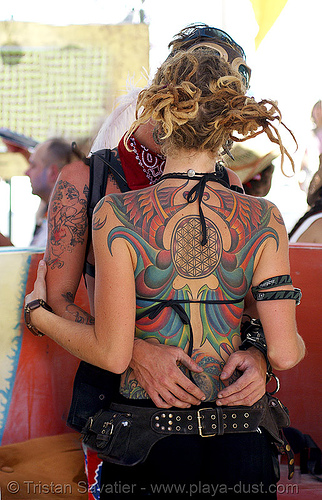For now, we need to get on with phoctober and on one day out I managed to get some half-decent shots in a small village about an hour's drive from Cape Town. Called Franschhoek, which literally means "French Corner", the village is an absolute delight and thusly generally overrun by tourists. Additionally, most of the farms - all vineyards - in the area have been bought by wealthy Germans, French and a few others besides. Unsurprisingly, as the village has come to life, property prices have skyrocketed... But it's not all "bad". Franschhoek boasts some of the best restaurants in the country and generally, it is very laidback and extremely beautiful - even if it does have a small element of the chi-chi about it with a preponderance of beauty spas and restaurants that might seriously dent all but a tourist's pocket. (Your money is worth considerably more than ours...)
Franschhoek was originally settled in 1688 by pioneering French Huguenots who fled their homeland when protestantism was outlawed - when the Edict of Nantes was revoked. The Dutch government of the time gave many of the families land in what was then known as Oliphants Hoek - Elephant Corner (named so because of the herds of elephant which roamed there). Farms such as La Motte, La Cotte, Cabriere, Provence, Chamonix, Dieu Donne and La Dauphine were among the first established. Most still retain their original farm houses and have grown into renowned wineries. The French heritage no doubt also goes a long way to explaining the superb food to be found in and around the village.
Take a look at either of these two websites (Franschhoek.org or Franschhoek.co.za) if you want to know more about a truly lovely area which I'm afraid my hastily snapped shots simply don't do justice to. Given that I feel the need to go out and do better, I suspect I'll be gadding off there again in the not too distant future - after all, no one can argue with the prospect of a good day out with beautiful scenery and fine food and wine! As we always say when we go there, "Oh shucks, another hellish day in Africa..."
Since I'm enjoying phoctober so much, I thought I'd run the shots over a few days - if you'd like to see them - would you? I thought I might do pavement cafes, shops, town vistas, scenes and almost aerial landscapes - i.e. shot from the window of a speeding car! That will no doubt take us into November and I'm not sure what I'll have to call phoctober then! Any suggestions? Photember? Novephoto?
But let's get on with some initial views - we'll step through the door and see where we go...

 The town hall - a form of Cape Dutch architecture which often bears a striking resemblance to swirly ice cream in cones...
The town hall - a form of Cape Dutch architecture which often bears a striking resemblance to swirly ice cream in cones... The village church - the Dutch Reformed Church or as it is known locally the Nederduits Gereformeerde Kerk...
The village church - the Dutch Reformed Church or as it is known locally the Nederduits Gereformeerde Kerk...The NGK developed amongst the Boers - the people of the Afrikaner nation, who included Dutch, French, German, Scottish and other Europeans. The religion is fundamentally Calvinist and given the isolation of these settlers they shut out influences of the Enlightenment. Plantation slavery was often seen as a form of evangelism and ultimately the Dutch Reformed religion came to be closely associated with apartheid policies as the religion became increasingly nationalised. You can read more here.

















No comments:
Post a Comment